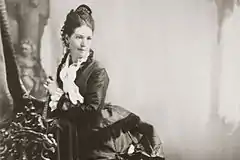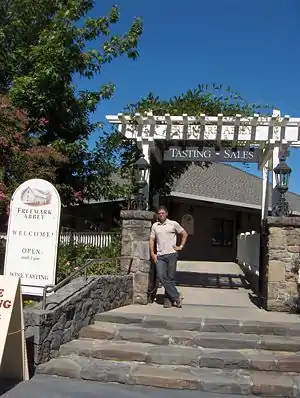Josephine Tychson
Josephine Marlin Tychson (March 5, 1855 - December 18, 1939) was the second woman to build and operate a winery in the Napa Valley.[1] In 1886, she established a winery in St. Helena, selling it in 1894. Its name changed to Lombarda Cellars and is now Freemark Abbey Winery.

Early life
Tychson was born in 1855, into a wealthy family from Pennsylvania.[2] John Marlin (d. 1878) and Eliza (née Bower; 1823-1860), her parents, had also lived in Astoria, Oregon; Tychson was one of 8 children.[2] She grew up in Philadelphia before the family moved to San Lorenzo.[3][2] At the age of 8, her mother died and her father remarried Eliza's sister.[2] Tychson's father and aunt were influential from a young age in her development as an independent, young women.[4]
Career

Following the death of her sister Catherine in 1874,[2] she married the Danish farmer, John C. Tychson. Their first child, Annette, was born in 1878.[2] In 1879, the young family moved to Denmark, where John took care of some affairs,[2] before returning to the United States. They moved to the Napa Valley in northern California, where they purchased a 147 acres of land just north of St. Helena from William James Sayward, a sea captain. They planted the vineyards in 1881, establishing Tychson Cellars five years later.[4][5] She lost her tuberculosis-afflicted husband to suicide at the Newland House Hotel in Oakland, leaving her to look after two children and the estate.[2][4]
According to an 1890 report by the California Board of State Viticultural Commissioners, the Tychson Winery cultivated Zinfandel, Riesling and Burgundy; it also noted that the estate had expanded to 65 acres of wine grapes, of which 55 acres were in bearing.[4] In 1893, Tychson lost some 10% of her grapes to the parasite phylloxera.[4] As a result, she sold the winery in the following year to foreman Nels Larson; Larson sold it to Anton Forni in 1898, who renamed it Lombarda Cellars after the region of Italy that he hailed from, a name it retained until it went out of business.[6][5]
Tychson, who never remarried, bought a white house opposite the vineyard.[2] She was described as "an intrepid Victorian widow who could often be spotted riding".[7] She died in 1939. Upon her death, the estate was sold to Charles Freeman, Mark Foster, and Abbey Ahern, giving it its name "Freemark Abbey".[8] Tychson was remembered in a Napa County Historical Society temporary exhibition at the site, “Harvesting History,” which documented the early viticulture of the Napa Valley.[4]
References
- Calistogan, David StonebergThe Weekly (16 September 2010). "History revealed: Four years makes a difference". Napa Valley Register. Retrieved 2021-01-22.
- Monahan 2013, p. 57.
- "At home: Ann Colgin". Colgin Cellars. Retrieved 7 April 2013.
- "The story of the first true Napa Valley female vintner". Napa Valley Register. 18 July 2010. Retrieved 6 April 2013.
- Shulman, Todd L. (28 September 2009). Napa County. Arcadia Publishing. p. 56. ISBN 978-0-7385-7039-6. Retrieved 6 April 2013.
- Monahan 2013, p. 58.
- Architectural Digest. Conde Nast Publications. April 2002. pp. 246–9. Retrieved 7 April 2013.
- Andrews, Avital (24 October 2012). Frommer's Napa and Sonoma Day by Day. John Wiley & Sons. p. 148. ISBN 978-1-118-49619-0. Retrieved 7 April 2013.
Bibliography
- Monahan, Sherry (26 March 2013). California Vines, Wines and Pioneers. The History Press. ISBN 978-1-60949-884-9. Retrieved 7 April 2013.